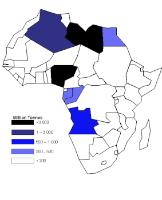Earlier this year, a significant fact went largely unnoticed in the media: Crude oil imports from sub-Saharan Africa (excluding the Arab North African producers of Algeria and Libya) to the United States surpassed those from the Middle East. According to data from the U.S. Energy Information Administration (EIA), the United States imported 1.736 million barrels per day (b/d) from Sub-Saharan Africa in February 2007 -- the bulk from Nigeria and Angola but also from Chad, Congo (Brazzaville), Equatorial Guinea and Gabon. This amount was slightly greater than imports from the Middle East -- Saudi Arabia, Iraq, Kuwait, and a small amount from Yemen -- which totaled 1.708 million b/d. In March 2007, the United States imported 2.194 million b/d from sub-Saharan Africa compared to 2.095 million b/d from the Middle East. Since April 2007, available EIA data show that the Middle East has surged ahead of sub-Saharan Africa once again as a source of imported oil to the United States, largely because of a steep decline in Nigeria's exports due to extensive civil unrest in its oil-producing provinces. But the trend over the last few years is clear: Africa is becoming a more important source of crude oil for the United States and in the longer term likely will become a more important source for the American market than the Middle East. In 2000, the United States imported 874,000 b/d of crude oil from Nigeria. This rose to 1.045 million b/d in 2006. In the first quarter of 2007 the total was still higher, at 1.152 million b/d. Similarly, the United States imported 294,000 b/d from Angola in 2000, and this rose to 512,000 b/d in 2006. In the first quarter of 2007, oil imports from Angola were still higher at 567,000 b/d. In addition, Equatorial Guinea and Chad are new sources of imported oil for the U.S. while a steady supply also comes from mature producers such as Congo (Brazzaville) and Gabon. Angola and Equatorial Guinea have rapidly increased oil output over the last few years while Nigeria, despite its current problems, is producing more than it was five years ago and has potential for further increases in output as well (from deepwater reserves).
Will Africa Rival the Middle East as a U.S. Oil Supplier?

